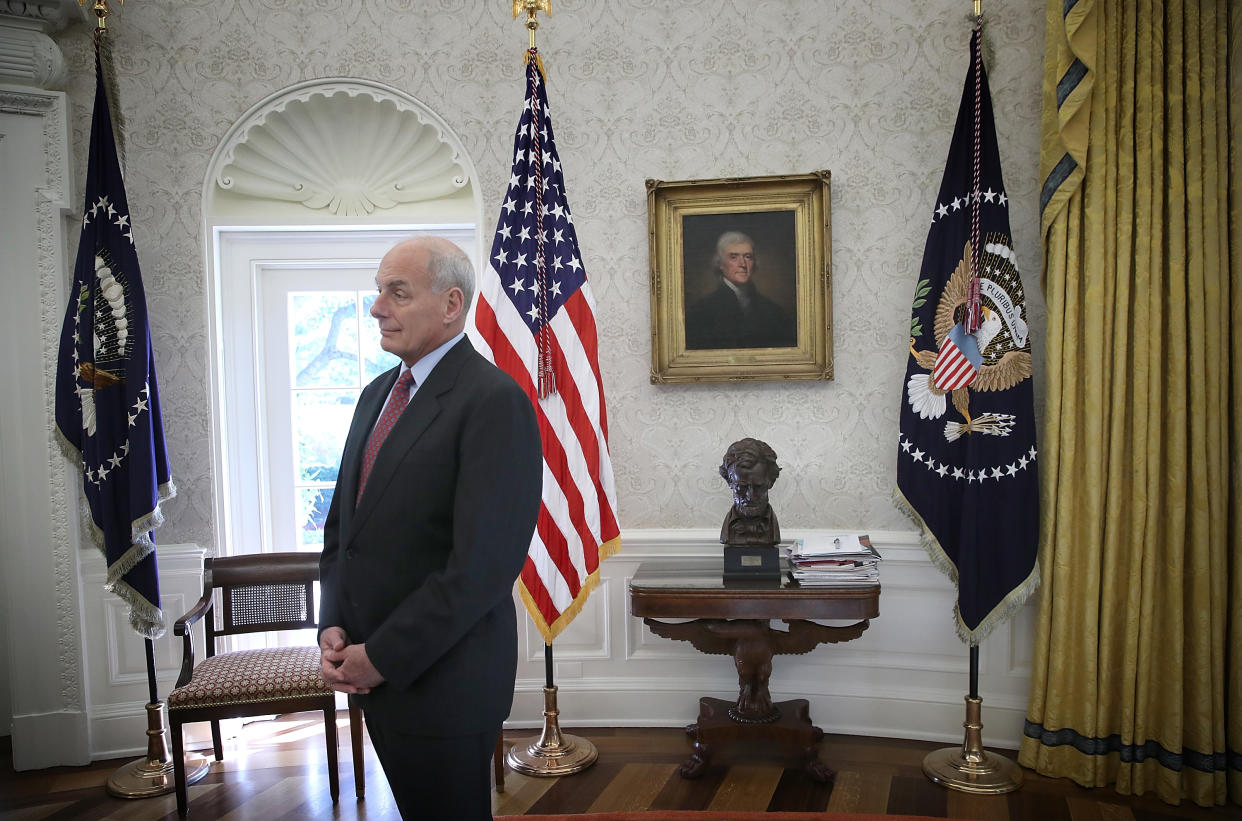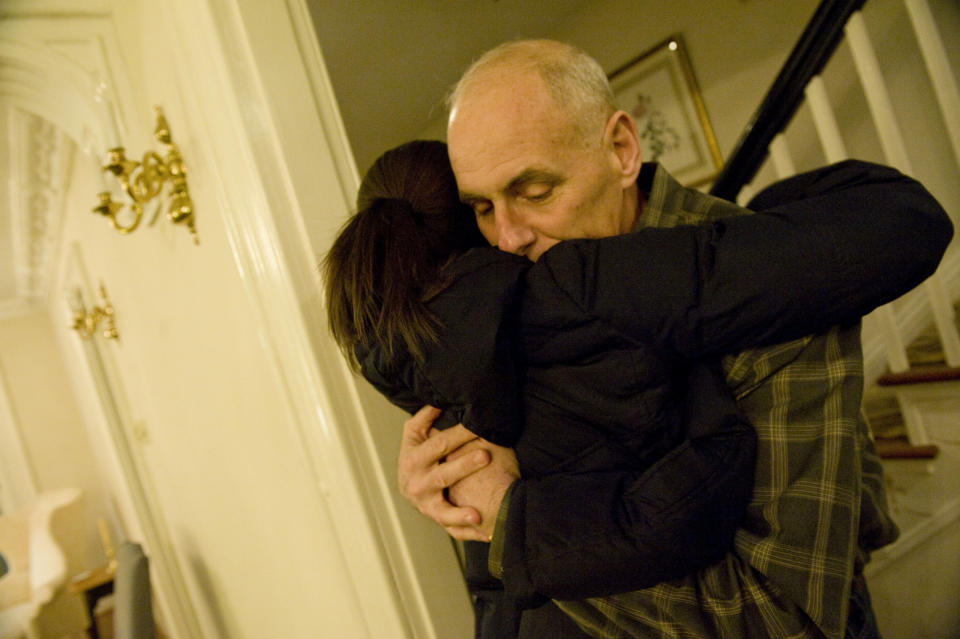8 Things to Know About Gen. John Kelly

In July, Donald Trump chosen retired Marine Gen. John F. Kelly as his new White House Chief of Staff, replacing Reince Priebus, whose job had been widely speculated as being on the line. Priebus had, in fact, been "looking for a graceful exit," The New York Times reported this week, but President Trump decided to announce the hiring/firing on Twitter Friday afternoon.
I am pleased to inform you that I have just named General/Secretary John F Kelly as White House Chief of Staff. He is a Great American....
- Donald J. Trump (@realDonaldTrump) July 28, 2017
...and a Great Leader. John has also done a spectacular job at Homeland Security. He has been a true star of my Administration
- Donald J. Trump (@realDonaldTrump) July 28, 2017
I would like to thank Reince Priebus for his service and dedication to his country. We accomplished a lot together and I am proud of him!
- Donald J. Trump (@realDonaldTrump) July 28, 2017
Kelly, who spent 40 years in the U.S. Marines including three tours in Iraq, was previously tapped by Trump lead the Department of Homeland Security, the third-largest Cabinet department, which oversees security at the nation’s airports and along its borders. "Gen. John Kelly’s decades of military service and deep commitment to fighting the threat of terrorism inside our borders makes him the ideal choice to serve as our Secretary of the Department of Homeland Security,” Trump said in a statement at the time. “He is the right person to spearhead the urgent mission of stopping illegal immigration and securing our borders, streamlining TSA and improving coordination between our intelligence and law enforcement agencies."
In his tweets confirming Gen. Kelly's new job, Trump described him as a "true star" and someone who had done a "spectacular job" leading the Department. Kelly, 66, is a Boston native with a decorated career in the military. Here’s what you need to know about him:
His son was killed in combat.

Kelly has the unfortunate distinction of being the highest-ranking military officer to lose a child in Iraq or Afghanistan. In 2010, Kelly’s son, Lt. Robert Michael Kelly, died in Afghanistan while leading a platoon. Kelly has said little publicly about the death of his son, but four days after his son's death, he gave a fiery speech about military sacrifice.
“Their struggle is your struggle,” he said. “If anyone thinks you can somehow thank them for their service and not support the cause for which they fight - our country - these people are lying to themselves.”
Kelly doesn’t mention his son in the speech, which has been shared widely online. In a 2013 dedication to a memorial to Marines and sailors killed in Afghanistan, Kelly alluded to his own loss: “From the bottom of my own broken heart, I’m sorry.”
During a press conference in early 2016, he did refer directly to his son.
"To lose a child is - I can't imagine anything worse than that. I used to think, when I'd go to all of my trips up to Bethesda, Walter Reed, I'll go to the funerals with the secretaries of defense, that I could somehow imagine what it would be like ... when you lose one in combat, there's a - in my opinion - there's a pride that goes with it, that he didn't have to be there doing what he was doing. He wanted to be there. He volunteered."
Kelly said he gets "occasional letters from gold star families who are asking, 'Was it worth it?' And I always go back with this: It doesn't matter. That's not our question to ask as parents. That young person thought it was worth it, and that's the only opinion that counts."
Trump famously and very publicly disparaged gold star parents Khizr and Ghazala Khan, whose son Capt. Humayun Khan, was killed in combat in Iraq. On October 17, 2017, he said President Obama didn't always call families of fallen soldiers, and invoked Kelly's story as evidence, according to Politico. “I mean, you could ask General Kelly did he get a call from Obama," he said. A White House official confirmed Trump's statement, though President Obama did host Kelly at an event for gold star families six months after his son's death; he and his wife sat at Michelle Obama's table.
He led United States Southern Command for four years.
The U.S. Southern Command is a vast area that includes the Caribbean and Central and South America. As the person in charge of this area, Kelly oversaw military operations, but, as the New York Times points out, the job is less about conflict and more about wielding America’s “soft power” in the region. That includes humanitarian aid and disaster relief. Kelly retired from the job in February 2016.
He questioned President Barack Obama’s decision to open combat jobs to women.
In January 2016, the Pentagon said it was opening combat roles in the military to women. Kelly, who was heading up U.S. Southern Command at the time, expressed concern over the decision, namely that the military would have to lower its standards to accept women in these roles.
“There will be great pressure, whether it’s 12 months from now, four years from now, because the question will be asked whether we’ve let women into these other roles, why aren’t they staying in those other roles?" he told reporters around the time of the announcement.
“If we don’t change standards,” he said, “it will be very, very difficult to have any numbers - any real numbers - come into the infantry, or the Rangers or the SEALs, but that’s their business.”
He oversaw the Guantanamo Bay prison.
As head of Southern Command, Kelly’s area of responsibility included the prison in Guantanamo Bay, Cuba, where he facilitated the prisoner swap for U.S. Army Sgt. Bowe Bergdahl, according to Defense One, a move he called “unusual.”
He has swatted away criticism about inhumane treatment of prisoners, the New York Times reported. Force-feeding prisoners on hunger strike, for instance, was a humane approach, according to Kelly.
He also insisted that one of the arguments for closing the prison - that it serves as a recruitment or propaganda tool for terror groups - is a nonsense argument.
“Bombing the living shit out of ISIS in Iraq and Afghanistan, Syria, that would maybe irritate them more than the fact we have Guantanamo open,” he told Defense One.
Before becoming Chief of Staff, he would have likely been responsible for building Trump’s promised wall.

The job of planning and building Trump’s wall between the U.S. and Mexican will likely fall on Homeland Security, according to the Washington Post. And Kelly seems to share Trump’s view of border security - something he would’ve had a unique view of during his time heading up Southern Command.
In a 2014 interview with Defense One, he described illegal drug trade and the flow of undocumented immigrants into the U.S. as an existential threat to the nation.
And, in congressional testimony in 2015, he suggested smugglers could be bringing terrorists into the country. “Despite the heroic efforts of our law enforcement colleagues, criminal organizations are constantly adapting their methods for trafficking across our borders,” Kelly told the Senate Armed Services Committee. “While there is not yet any indication that the criminal networks involved in human and drug trafficking are interested in supporting the efforts of terrorist groups, these networks could unwittingly, or even wittingly, facilitate the movement of terrorist operatives or weapons of mass destruction toward our borders.’’
During a 2014 hearing, he told the Senate Armed Services Committee that he didn't have the ships or surveillance assets to get more than 20 percent of the drugs leaving Colombia for the U.S. He said he often had "very good clarity" on the drug traffickers, but much of the time, "I simply sit and watch it go by."
At his confirmation hearing, he indicated that a wall alone wouldn't be enough to defend the southern border. “It has to be a layered defense,” he said. “If you build a wall, you would still have to back that wall up with patrolling by human beings, by sensors, by observation devices.”
He made a splash on his first day.
On July 31, his first day on the job, Kelly was reportedly the force behind pushing out Anthony Scaramucci, the blink-and-you-missed-him communications director who was announced just 11 days earlier. According to the New York Times, Kelly made clear at a meeting Monday morning that he is in charge.
He fired Steve Bannon shortly after arriving.
On August 18, Kelly fired controversial chief strategist Steve Bannon. “White House Chief of Staff John Kelly and Steve Bannon have mutually agreed today would be Steve’s last day,” press secretary Sarah Huckabee Sanders, said in a statement, according to the New York Times. “We are grateful for his service and wish him the best.”
His body language has gone viral.
The Washington Post notes that photos of Kelly covering his face or looking down when President Trump is speaking have gone viral, leading some to think he is exasperated with the president. The below photo was taken after the white supremacist rally in Charlottesville, Virginia, while Trump said there were "good people" on both sides.
John Kelly during the President's Q and A at Trump Tower pic.twitter.com/vxR3hTUqe3
- Kristin Donnelly (@kristindonnelly) August 15, 2017
And the below was taken while Trump addressed the United Nations, saying the U.S. would "totally destroy" North Korea.
John Kelly's reaction to Trump calling Kim Jong Un "Rocket Man" and saying he'd "totally destroy" North Korea: pic.twitter.com/S0ZR7B3Hql
- Nick Jack Pappas (@Pappiness) September 19, 2017
It's unclear whether Kelly was simply caught at the wrong moment or meant to convey dissatisfaction with his body language, but the photos were spread on social media regardless.
With reporting from the Associated Press.
This article was first published on December 7, 2016 and has been updated.
You Might Also Like

